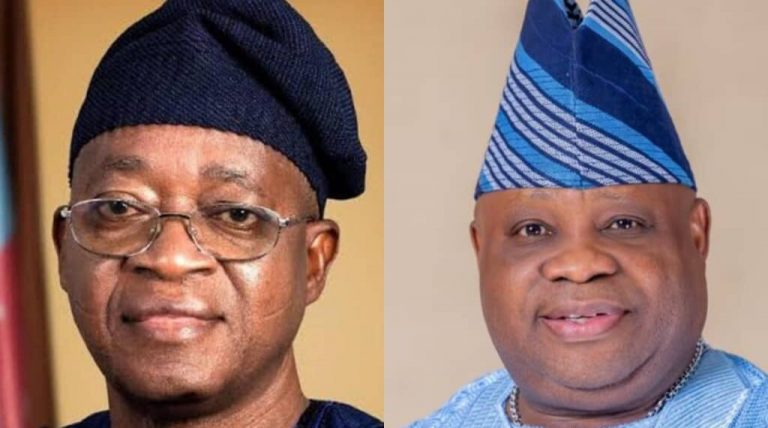
Like other governorship elections that precede the general elections, Osun governorship election has always thrown up various intrigues. In 2018, ‘inconclusive election’ became the new term in Nigeria’s election discourse when the Independent National Electoral Commission announced its failure to complete the conduct of the year’s election due to some issues. The declaration of Alhaji Gboyega Oyetola of the All-Progressives Congress as the winner of the election eventually surprised the main opposition party (PDP), believing that its candidate, Senator Ademola Adeleke won the election.
As the Constitution and the Electoral Act stated, Senator Ademola Adeleke and his party approached Election Tribunal and fought the battle through the Court of Appeal to the Supreme Court. At the State Election Tribunal, Senator Ademola Adeleke was declared the winner of the election. The three-member panel of the tribunal ruled that the rerun election held on September 27, 2018, was illegal. Therefore, the tribunal found deducting the votes scored by the APC candidate Gboyega Oyetola at the rerun after declaring the rerun illegal appropriate to pave way for Senator Ademola Adeleke to be the elected governor. At the Court of Appeal, the judgement of the tribunal was nullified by judges and the court resolved 10 out of the 12 issues raised in favour of Oyetola and the two others in favour of Ademola and his PDP. The Supreme Court agreed substantially with the Court of Appeal which ruled that a majority judgement delivered at the tribunal was nullity.
These trends are expected as the State Tribunal delivered its judgement regarding the 2022 governorship election in which Senator Ademola Adeleke was declared the winner. As stated previously, the state election always has different interesting insights. While technology did not play a significant role during the 2018 election, the recent election has been mostly described as the primary beneficiary of the BVAS, introduced by the electoral body for ensuring credible polls, in terms of its prowess of revealing over-voting. The moment from the tribunal to the Court of Appeal and the Supreme Court has always been interesting for the political actors and their supporters on different platforms. From online communities to physical settings, they usually throw banters. The constant posting and reporting by news media using different frames to set specific agendas have largely enhanced people’s interest in seeking information about the candidates, political parties (APC and PDP) and supporters.
Register for Tekedia Mini-MBA edition 19 (Feb 9 – May 2, 2026): big discounts for early bird.
Tekedia AI in Business Masterclass opens registrations.
Join Tekedia Capital Syndicate and co-invest in great global startups.
Register for Tekedia AI Lab: From Technical Design to Deployment (next edition begins Jan 24 2026).
The people’s curiosity across the country usually starts from seeking information about the election tribunal. For example, our digital research conducted during the first few months after each of the 2018 and 2022 elections reveals people’s interest in knowing the petitioners and respondents, the grounds of the election petition and the members of the tribunal. Our analyst also found that many people want to know the timeline for completing tribunal proceedings, the rules that bind the tribunal and whether the tribunal would be fair and impartial in its judgement. The legal remedies that are available to the parties if the tribunal fails to be ethical and delivered fair judgment were also explored by many.
The Emerging Twists
The examination of these concerns in the news media and on digital platforms such as Facebook, Twitter and WhatsApp groups indicates that people are getting answers to their questions asked before the tribunal judgment. They are getting answers from the main actors and sub-actors who do not care about the quality of the information the questioners are consuming. In the last 24 hours, online communities have been awash with different interpretations of the tribunal judgement. The People’s Democratic Party and its candidate, Governor Adeleke do not believe in the majority judgment but align with the minority judgement. The All Progressives Congress keenly aligns with the majority judgement. Both had earlier exchanged banters over “the needless” prayer towards favourable judgement. The same prayer is now a strategic and significant tool for navigating the slippery floors of the Court of Appeal and the Supreme Court in the next few months.
From online to the physical sphere, the supporters of both candidates have succeeded in facilitating physical protests in some towns. Our examination of the protests considering expressions from the leaders reveals that it is now the case of town-political party alignment. People in Osogbo, Ede, Ikirun, Ilesha and Ila-Orangun protested in support of the PDP and its candidates, while those in Iwo and Iragbiji found Alhaji Gboyega Oyetola worthy of following in his journey to the appellate and supreme courts.
“Osun tribunal was made to make a pronouncement that will make us cast doubt on BVAS. They have partially succeeded in doing it, but I urge us to look beyond that falsified judgment. Even the preferred candidate wasn’t that jubilant, it’s a hatchet job to make us feel bad about BVAS,” a Twitter user said.
As the actors and their supporters, especially those in digital platforms, continue finding holes in the judgement and using them to push out their various agendas towards shaping public minds, our analyst notes that they should consider the consequences of spreading false and misleading information. Already, many properties have been destroyed and people traumatized through the unnecessary closure of roads within 24 hours.




Interesting insight…This should be followed through to the end.